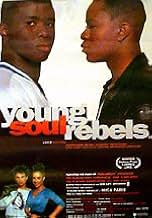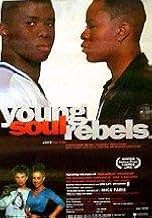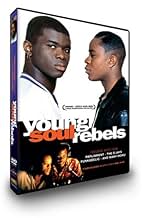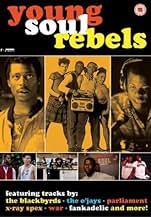Two disc jockeys have a friend's murder to solve in the fringe-group melting pot of 1977 London.Two disc jockeys have a friend's murder to solve in the fringe-group melting pot of 1977 London.Two disc jockeys have a friend's murder to solve in the fringe-group melting pot of 1977 London.
- Director
- Writers
- Stars
- Awards
- 1 win total
Eamonn Walker
- Carlton
- (as Eamon Walker)
- Director
- Writers
- All cast & crew
- Production, box office & more at IMDbPro
Featured reviews
Johnny Mills , as one of the skinhead kissing gay punks in the night club , is the highlight of this movie. He also appeared with Tilda Swinton in Derek Jarman's The Garden 1990.
I am currently writing a paper on this film and another for one of my film classes, Topics in National Cinemas, as it was one of the films we examined. While perusing this page for certain information I needed i happened to read the previous comment that someone had posted regarding what they thought of the film.
While reading this individual's comments it occurred to me that they COMPLETELY misunderstood the film and what it set out to challenge and address. This film is NOT a murder mystery. Yes, a murder occurs and sets off the story, but it is no more essential to the plot than is the youth in a coma in La Haine (Kassovitz, 1995). Like La Haine, this film sets out to address social issues pertaining to race, class, positioning in the political landscape, and, unlike La Haine, sexuality (which seemed to greatly disturb the previous individual who posted).
Young Soul Rebels examines the social landscape of late 1970s Britain, and particularly how it affects youths within the greatly marginalized "Black" culture. It confronts issues of diaspora, through the juxtaposition of different aspects of the "Black" culture, as in the rastas working at the garage, compared with the two, funk obsessed (and much more "Afro-English") main characters. It also looks at the intersection at which certain sub-cultural borders collide, as in the Punks, the Funks, and the Reggaes, as well as Hetero and Homosexuality. Ultimately this notion of collision is key to understanding this film for what it is, which is precisely identities in collision. If the previous individual who posted had understood this, then they would have also seen how the murderer's motives implied this idea of identity collision, were driven by it and pertained more to it than to reading the film as a simple "whodunnit." In this light, you'll also find that music drives the film, both as a signifier for identities, and as an expression of them. Music is certainly an essential component to this film.
For more information regarding the issues this film juggles, and for a greater understanding of its concepts and meanings, look at the writings of Paul Gilroy, particularly his book "Ain't No Black in the Union Jack," and the film's director, Isaac Julien.
While reading this individual's comments it occurred to me that they COMPLETELY misunderstood the film and what it set out to challenge and address. This film is NOT a murder mystery. Yes, a murder occurs and sets off the story, but it is no more essential to the plot than is the youth in a coma in La Haine (Kassovitz, 1995). Like La Haine, this film sets out to address social issues pertaining to race, class, positioning in the political landscape, and, unlike La Haine, sexuality (which seemed to greatly disturb the previous individual who posted).
Young Soul Rebels examines the social landscape of late 1970s Britain, and particularly how it affects youths within the greatly marginalized "Black" culture. It confronts issues of diaspora, through the juxtaposition of different aspects of the "Black" culture, as in the rastas working at the garage, compared with the two, funk obsessed (and much more "Afro-English") main characters. It also looks at the intersection at which certain sub-cultural borders collide, as in the Punks, the Funks, and the Reggaes, as well as Hetero and Homosexuality. Ultimately this notion of collision is key to understanding this film for what it is, which is precisely identities in collision. If the previous individual who posted had understood this, then they would have also seen how the murderer's motives implied this idea of identity collision, were driven by it and pertained more to it than to reading the film as a simple "whodunnit." In this light, you'll also find that music drives the film, both as a signifier for identities, and as an expression of them. Music is certainly an essential component to this film.
For more information regarding the issues this film juggles, and for a greater understanding of its concepts and meanings, look at the writings of Paul Gilroy, particularly his book "Ain't No Black in the Union Jack," and the film's director, Isaac Julien.
Been a long time since I saw this movie, but whenever I think of it, or even just hear that song from the soundtrack, I feel all happy and <ahem> gay. Funny thing is, I went back to see what I'd noted about it at the time (1991), and apparently I'd only considered it a so-so film!
So, yes, perhaps the story line was a bit flimsy, perhaps all of the movie didnt amount to a whole much ... but if the memory of it still makes me smile after ten years, it must've been a lot better than I'd originally realised! ;-)
So, yes, perhaps the story line was a bit flimsy, perhaps all of the movie didnt amount to a whole much ... but if the memory of it still makes me smile after ten years, it must've been a lot better than I'd originally realised! ;-)
I'm afraid that this is a bit all over the place. In attempting to deal with multiple issues simultaneously it ends up doing justice to none of them well. A man is killed while cruising for gay sex in a local park and the subsequent investigation tries to deal with racism, sexism and homophobia amongst both the local community and the police. At times it is a love story - platonic and sexual between friends and lovers but the lines are blurred and the conflict seems largely manufactured. The performances are clunky and the script likewise. Sorry, but too much of a hutch-potch for me to make much sense of.
Unfortunately by choosing to set the film in such a specific time it has lost relevance. Added to the utterly clunky script and the dire and wooden acting it makes me wonder if and how the film ever was a success.
The murder angle was a complete mystery to me. Why did it happen? How come the victim didn't recognise the killer? That the murder and its (sort of) solving framed the film seemed totally extraneous. Why didn't Chris also get murdered?
Between this we got a disconnected story of a couple of black lads one of whom was openly gay and seemingly not getting stick for it on his rough council estate.
Lovemaking scenes - both gay and straight ones - were vastly unconvincing especially between Caz and his new punk amour. After this latter all I could think was "Was that all?".
I watched this because of an article in the Guardian detailing the "20 Best LGB Films". A couple of the choices on the list surprised me and I didn't think they deserved to be there. Nor does this dreadful effort either.
The murder angle was a complete mystery to me. Why did it happen? How come the victim didn't recognise the killer? That the murder and its (sort of) solving framed the film seemed totally extraneous. Why didn't Chris also get murdered?
Between this we got a disconnected story of a couple of black lads one of whom was openly gay and seemingly not getting stick for it on his rough council estate.
Lovemaking scenes - both gay and straight ones - were vastly unconvincing especially between Caz and his new punk amour. After this latter all I could think was "Was that all?".
I watched this because of an article in the Guardian detailing the "20 Best LGB Films". A couple of the choices on the list surprised me and I didn't think they deserved to be there. Nor does this dreadful effort either.
Did you know
- TriviaThe film takes place in 1977.
- GoofsThe two punk bands GBH and Conflict weren't around in 1977.
- ConnectionsFeatured in Queerama (2017)
- SoundtracksP. Funk Wants To Get Funked Up
Performed by Parliament
Licensed Courtesy of Casablanca Records Inc/Polygram Records Inc (New York)
- How long is Young Soul Rebels?Powered by Alexa
Details
Box office
- Gross US & Canada
- $225,664
- Opening weekend US & Canada
- $2,609
- Nov 24, 1991
- Gross worldwide
- $225,664
Contribute to this page
Suggest an edit or add missing content




























